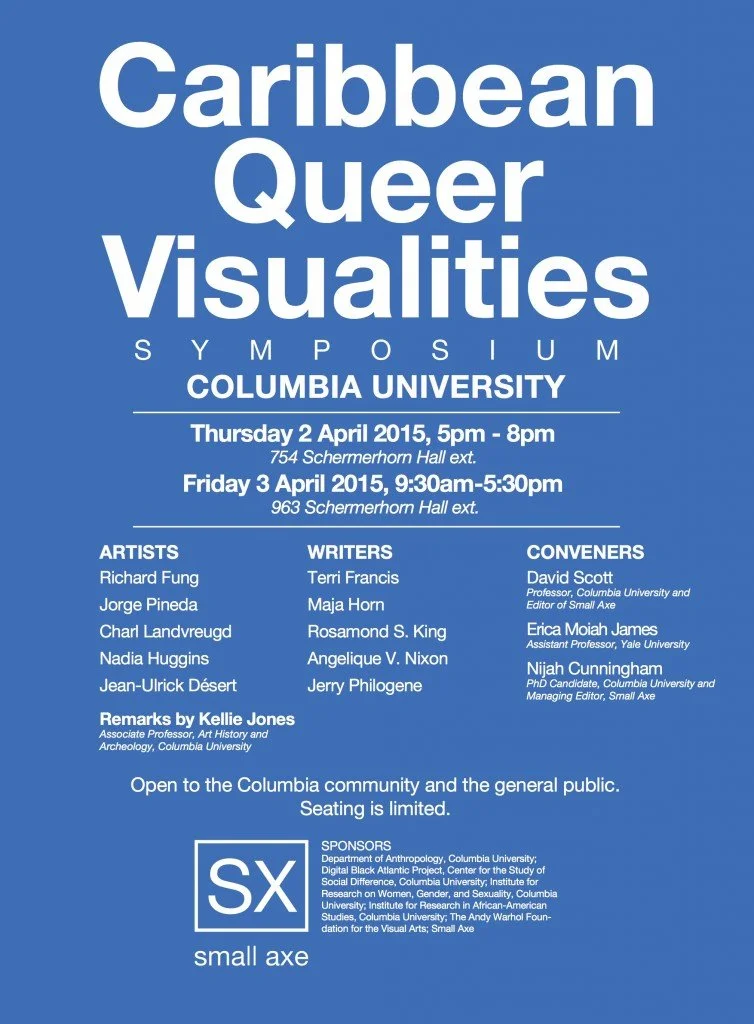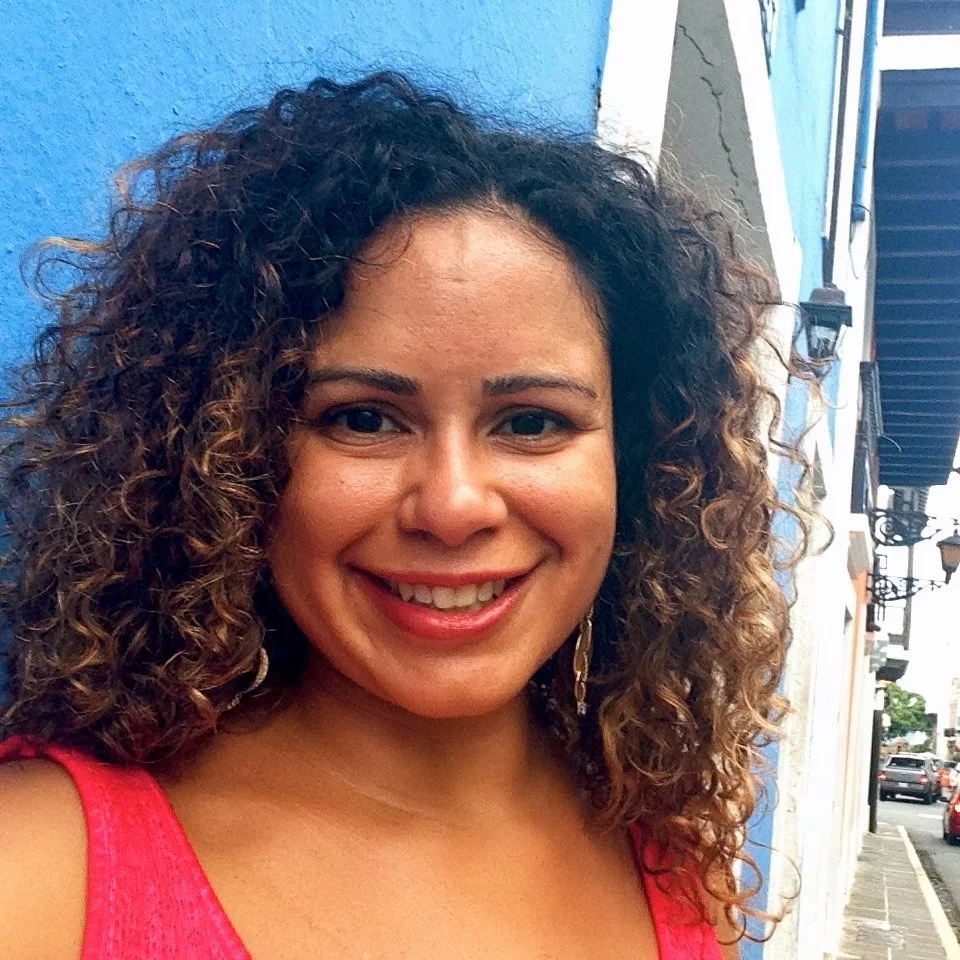David Scott Wins Distinguished Editor Prize from the Council of Learned Journals
David Scott, Professor of Anthropology at the Institute for Research in African American Studies, Columbia University, and former co-director of CSSD's Digital Black Atlantic Project, received the Distinguished Editor prize from the Council of Editors of Learned Journals for his work on Small Axe: A Caribbean Journal of Criticism.
“Small Axe edited and published under Scott’s vision has become one of most relevant intellectual and creative publications for our current political, social and cultural climate. Small Axe continues to reflect the ‘problem space’ of the contemporary global moment," said Roshini Kempadoo, lecturer at University of Westminster.
Read more about David Scott's prize here.
Caribbean Digital II Surveys the Past and Future of Diasporic Communications
“The Caribbean is preparing the future,” said David Scott, Professor of Anthropology, Columbia University, as he introduced the second installment of “The Caribbean Digital,” a conference organized by CSSD’s Digital Black Atlantic working group.
Focused on “Histories, Cartographies, Narratives,” the daylong event on the Columbia campus began with Scott’s recollection of a conversation with the Cuban intellectual Roberto Fernandez Retamar about the promising nature of fieldwork centered on communications within and about the Caribbean region. “He didn’t say ‘our future’ or ‘its future’—he said ‘the future,’” clarified Scott.
Presenters proceeded to consider how Caribbean communication networks were global and experimental long before the advent of the Internet and other technologies. Participants also explained how the region poses unique challenges and opportunities for the digital era.
For the “Histories” panel Vincent Brown, Professor of History, African, and African American Studies, Harvard University, presented his interactive website documenting the research amassed in Richard S. Dunn’s A Tale of Two Plantations: Slave Life and Labor in Jamaica and Virginia. Tracking the lives of more than 400 enslaved individuals—an unprecedented trove of genealogical information—the website foregoes the format of the family tree in favor of visualizations that emphasize belonging and connection across generations and between plantations. Brown ultimately offered a critique of the family tree as a technology first designed to track royal blood and organize patriarchal patterns of inheriting property. Recognizing these limits, Brown advocated for experimentation with new ways to represent the bonds between people who were property and whose families were regularly disrupted by early death and sudden sale.
Laurent Dubois, Professor of History, Duke University and Mary C. Lingold, English doctoral candidate, Duke University, also emphasized the interpretive innovation required to “read” even a single historical document: in this case, Hans Sloane’s transcription of three songs for banjo and percussion performed by Africans in Jamaica in 1688. Though much information is missing in the musical notation, Dubois and Lingold have carefully reconstructed and recorded versions of what these songs might have sounded like, bringing to life the sensory world of late seventeenth-century plantation society. Dubois and Lingold argued against the common misconception that digital humanities projects always aim to “do more, faster;” their project instead promotes the time-honored practice of close reading, deepened by new tools.
For the panel on “Cartographies,” Alex Gil, Affiliate Faculty, English and Comparative Literature, Columbia University and Kaiama Glover, Associate Professor of French, Barnard College, continued the theme of collaboration in both method and material.
The pair’s joint project-in-progress, “In the Same Boats,” will eventually track the overlapping trajectories of African diasporic intellectuals as they crisscross the Atlantic. Originally inspired by the travels of Rene Depestre to Cuba, Haiti, and Czechoslovakia, Professor Glover conceived of a multimedia platform that would allow her to visualize his intersections in space and time with other migratory artists like Langston Hughes, Josephine Baker, and Alejo Carpentier. Too often, these connections are obscured by the academy’s departmental model, which segregates French, Spanish, English, and Portuguese departments from one another.
Gil and Glover acknowledged that they have a long way to go in realizing their vision, but emphasized the importance of sharing the experimental process behind digital projects. Gil steered the conversation towards the audience and the longevity of digital projects. Building sites using “minimal computing” makes data available even where Internet service is unreliable and helps sites remain flexible as technologies change. Digital projects have the potential to model democratic ethics for scholarly work, even as they demand new skills and more—not less—labor than analog investigations.
The final panel, “Narratives,” consisted of a conversation between the Caribbean artists Robert Antoni and Oonya Kempadoo, moderated by Kelly Baker Josephs, Professor of English, York College/CUNY. Antoni’s project is a digital companion to his most recent novel, As Flies to Whatless Boys, supplementing the traditionally fixed space of the text with dreamlike video sequences. Kempadoo’s project, Naniki, exists wholly online, utilizing the multi-dimensionality of the digital space to form a speculative narrative that raises questions about Caribbean sustainability.
The diverse projects highlighted by the conference prove that digitization—and the quantitative data analysis that makes it possible—does not have to mean scholarship without affect, or history without politics. Learning to use new tools actually gives us the space to ask how the tools we use always condition the knowledge we produce and the stories we tell.
Contributed by Carina del Valle Schorske
The Caribbean Digital II: Histories, Cartographies, Narratives
The Digital Black Atlantic Project's Caribbean Digital II conference convenes on December 4, 2015, with an afternoon of multiform panel presentations that will engage critically with the digital as praxis. Panelists will reflect on the challenges and opportunities presented by the media technologies that ever more intensely reconfigure the social, historical, and geo-political contours of the Caribbean and its diasporas.
Presenters will consider the affordances and limitations of the digital with respect to their particular methodologies – notably, representing the past, historicizing space, and telling stories. Discussions will pick up themes addressed in the 2014 inaugural event as well as anticipate the launch of sx:archipelagos, a peer-reviewed Small Axe Project publishing platform dedicated to scholarship of and emerging from the Caribbean – set to go live in 2016.
Digital Black Atlantic Project Attracts Grants and Honors
The CSSD working group Digital Black Atlantic Project (DBAP) is starting the academic year with an array of honors and awards.
The National Endowment for the Humanities granted DBAP a $29,000 digital start-up grant for the development of the beta version of its peer-reviewed digital publishing platform sx:archipelagos.
Project co-director Kaiama L. Glover was elected a Schomburg Fellow-in-Residence for the development of In the Same Boats: Toward an Afro-Atlantic Intellectual History, an interactive digital bio-bibliographical map/timeline project that traces and visually represents the circulation of seminal Afro-Atlantic intellectuals and cultural actors – and their ideas – across the 20th century.
Project Co-director David Scott and working group participant Hebe Mattos were awarded a grant from Columbia University’s Global Centers initiative for the further development of their transnational project, Slavery and Repair, an online pedagogical model and scholarly resource for the representation of alternative histories of transatlantic slavery.
Working group participant Kim Hall was awarded a TOW Innovative Pedagogy Award as well as the inaugural faculty partner of the year award for her launch of the Digital Shange Project and development of the digital-based course “The Worlds of Shange.”
CSSD Project's Digital Publishing Platform Wins NEH Grant
The National Endowment for the Humanities (NEH) has awarded a Digital Humanities Start-Up Grant for 2015-2016 for the initial development of sx:archipelagos, a peer-reviewed digital publishing platform that emerged from CSSD's working group, the Digital Black Atlantic Project (DBAP).
Dedicated to research concerning the Caribbean, sx.archipelagos is produced by members of DBAP, which is directed by Kaiama Glover, and the Small Axe Project, a platform for intellectual criticism in the Caribbean. Focused on attenuating some of the disparities of access to scholarship about the Atlantic world for scholars and cultural actors in the Caribbean and Latin America, the platform has taken as its mandate an exploration of the economic feasibility of both 100% open-access and a streamlined production workflow for scholarly publication. Four members of DBAP, David Scott, Alex Gil, Kelly Baker Josephs, Kaiama Glover, along with several others will generate content for the initial launch of the project.
SYMPOSIUM: Caribbean Queer Visualities, April 2-3, 2015, Co-sponsored by Digital Black Atlantic Project
Caribbean Queer Visualities, co-sponsored by the CCSD working group the Digital Black Atlantic Project, reflects on and stimulates the production of creative and critical work that takes seriously the emergence of heterodox personal and public identities, identities that breach or subvert or evade the heteronormativities of colonial and postcolonial modes of being and self-expression. Growing in part out of a concern about the catastrophes of sexual othering, not to say sexual violence, so rampant in the Caribbean, the conference asks whether or to what extent “queer” offers a way of understanding the contemporary in Caribbean visual art practice, and in scholarly considerations of this practice. Why is it imperative for Caribbean cultural workers—intellectuals and artists—to think about the efficacy of “queer”? What might thinking through “queer” illuminate about the contemporary in Caribbean art practice?
The conference is open to the public and the schedule is available here.
Thursday April 2, 2015, 5pm - 8pm, 754 Schermerhorn Hall Extension
Friday April 3, 2015, 9:30am-5:30pm, 963 Schermerhorn Hall Extension
Participants:
Writers: Terri Francis, Maja Horn, Rosamond S. King, Angelique V. Nixon, Jerry Philogene.
Artists: Richard Fung, Jorge Pineda, Charl Landvreugd, Nadia Huggins, Jean-Ulrick Désert
Remarks by Kellie Jones, Associate Professor, Art History and Archeology, Columbia University
CONFERENCE REPORT: 2014 Caribbean Digital Conference
The Digital Black Atlantic Project closed the fall of 2014 with an unprecedented event, its inaugural Caribbean Digital conference.
On December 4th and 5th, professors, artists, graduate students, activists and administrators explored the dimensions of digital expression and its implications on the Caribbean and its diaspora. Panelists from across the globe joined a conversation at Barnard College in person, on Skype, and via Livestream, sharing theories and cautionary tales about various approaches to building projects and creating community in an increasingly digital academic environment. With a focus on the Caribbean and its diaspora, the conference offered fertile ground for analyzing the intersection of information technologies with fields such as American studies, gender and sexuality studies, queer studies, black studies, ethnomusicology, and communications, among others.
The conference showcased radical approaches to the archive throughout its seven panels. Researchers and educators of color were a strong presence at Caribbean Digital, contributing in important ways to the breadth of topics that inform the critical discipline that is the digital humanities. The panel discussions were preceded by the Kamau Brathwaite researchathon held on Thursday morning and afternoon. This singular event—kicking off the ongoing the collaborative constitution of an open-access, online bibliography of work by and on Caribbean intellectual Brathwaite—generated over 500 bibliographic contributions in just six hours.
With the help of Twitter hashtag #sxcd2014 and the conference website, extensive social media activity gave enormous reach to the two-day event. Questions fielded from Twitter kept the conversations fresh and helped to archive what is planned to be the first of many conferences concerning archipelagic formations of digital networks and/in the Caribbean. David Scott, anthropology professor at Columbia and founder of the Small Axe print journal, closed the conference with a provocative reflection on the futures of publishing.
The event's primary organizers were Kaiama L. Glover, associate professor of French and Africana studies at Barnard, Kelly Baker Josephs, associate professor of English at York College, CUNY, and Alex Gil, digital scholarship coordinator and affiliate faculty in English and comparative studies at Columbia. Generously supported by the Center for the Study of Social Difference at Columbia, along with the Barnard Africana Studies Department and Barnard's Committee for Online and On-Campus Learning (COOL), the conference drew a sizeable audience from within the campus community in addition to drawing participants from around the tri-state area and, of course, cyberspace.
PUBLICATION: Yarimar Bonilla on "#Ferguson: Digital protest, hashtag ethnography, and the racial politics of social media in the United States"
Yarimar Bonilla of the Digital Black Atlantic Working Group and Jonathan Rosa have published "#Ferguson: Digital protest, hashtag ethnography, and the racial politics of social media in the United States" in the January 2015 issue of the American Ethnologist.
As thousands of demonstrators took to the streets of Ferguson, Missouri, to protest the fatal police shooting of unarmed African American teenager Michael Brown in the summer of 2014, news and commentary on the shooting, the protests, and the militarized response that followed circulated widely through social media networks. Through a theorization of hashtag usage, Bonilla and Rosa discuss how and why social media platforms have become powerful sites for documenting and challenging episodes of police brutality and the misrepresentation of racialized bodies in mainstream media. The piece demonstrates how engaging in “hashtag activism” can forge a shared political temporality, and, additionally, examines how social media platforms can provide strategic outlets for contesting and reimagining the materiality of racialized bodies. Their analysis combines approaches from linguistic anthropology and social movements research to investigate the semiotics of digital protest and to interrogate both the possibilities and the pitfalls of engaging in “hashtag ethnography.”
Read it here.








